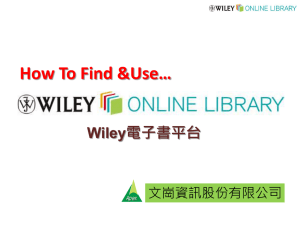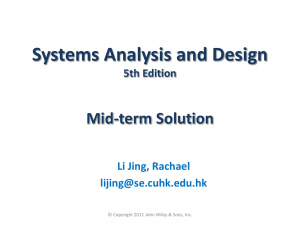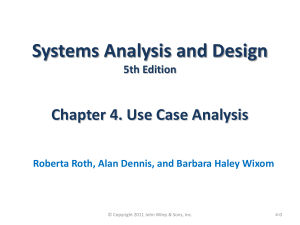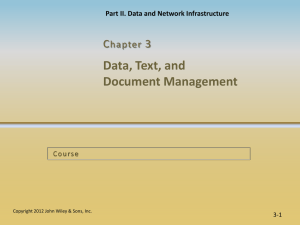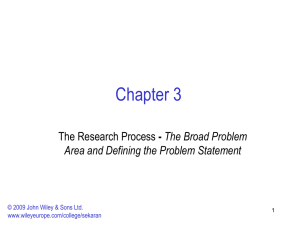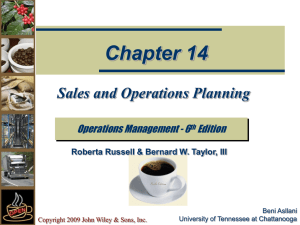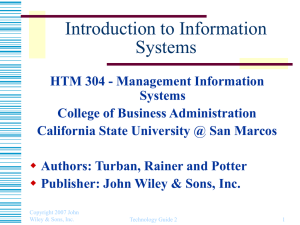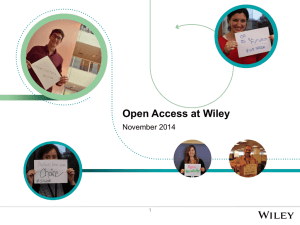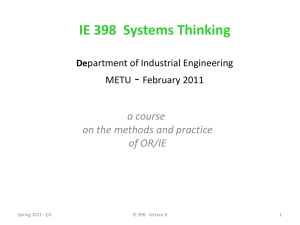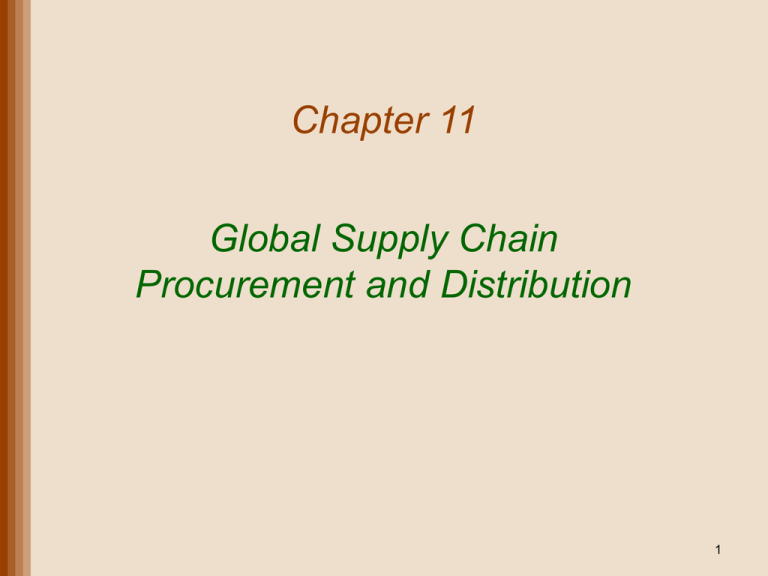
Chapter 11
Global Supply Chain
Procurement and Distribution
1
Lecture Outline
•
•
•
•
•
Procurement
E-Procurement
Distribution
Transportation
The Global Supply Chain
Copyright 2011 John Wiley & Sons, Inc.
11-2
Procurement
• The purchase of goods and services from suppliers
• Cross enterprise teams
• coordinate processes between a company and its supplier
• On-demand (direct-response) delivery
• requires the supplier to deliver goods when demanded by the
customer
• Continuous replenishment
• supplying orders in a short period of time according to a
predetermined schedule
Copyright 2011 John Wiley & Sons, Inc.
11-3
Outsourcing
• Sourcing
• selection of suppliers
• Outsourcing
• purchase of goods and services from an
outside supplier
• Core competencies
• what a company does best
• Single sourcing
• a company purchases goods and services
from only a few (or one) suppliers
Copyright 2011 John Wiley & Sons, Inc.
11-4
Categories of Goods and Services
Copyright 2011 John Wiley & Sons, Inc.
11-5
E-Procurement
• Direct purchase from suppliers over the Internet,
by using software packages or through emarketplaces, e-hubs, and trading exchanges
• Can streamline and speed up the purchase
order and transaction process
Copyright 2011 John Wiley & Sons, Inc.
11-6
E-Procurement
• What can companies buy over the Internet?
• Manufacturing inputs
the raw materials and components that go directly
into the production process of the product
• Operating inputs
maintenance, repair, and operation goods and
services
Copyright 2011 John Wiley & Sons, Inc.
11-7
E-Procurement
• E-marketplaces (e-hubs)
• Websites where companies and suppliers
conduct business-to-business activities
• Reverse auction
• process used by e-marketplaces for buyers to
purchase items; company posts orders on the
internet for suppliers to bid on
Copyright 2011 John Wiley & Sons, Inc.
11-8
Distribution
• Encompasses all channels, processes, and functions,
including warehousing and transportation, that a product
passes on its way to final customer
• Order fulfillment
• process of ensuring on-time delivery of an order
• Logistics
• transportation and distribution of goods and services
• Driving force today is speed
• Particularly important for Internet dot-coms
Copyright 2011 John Wiley & Sons, Inc.
11-9
Distribution Centers (DC)
and Warehousing
• DCs are some of the largest business facilities in
the United States
• Trend is for more frequent orders in smaller
quantities
• Flow-through facilities and automated material
handling
• Postponement
• final assembly and product configuration may
be done at the DC
Copyright 2011 John Wiley & Sons, Inc.
11-10
Warehouse Management Systems
• Highly automated system that runs day-to-day operations
of a DC
• Controls item putaway, picking, packing, and shipping
• Features
• transportation management
• order management
• yard management
• labor management
• warehouse optimization
Copyright 2011 John Wiley & Sons, Inc.
11-11
A WMS
Copyright 2011 John Wiley & Sons, Inc.
11-12
Vendor-Managed Inventory
• Manufacturers generate orders, not distributors
or retailers
• Stocking information is accessed using EDI
• A first step towards supply chain collaboration
• Increased speed, reduced errors, and improved
service
Copyright 2011 John Wiley & Sons, Inc.
11-13
Collaborative Logistics and Distribution
Outsourcing
• Collaborative planning, forecasting, and
replenishment create greater economies of
scale
• Internet-based exchange of data and
information
• Significant decrease in inventory levels and
costs and more efficient logistics
• Companies focus on core competencies
Copyright 2011 John Wiley & Sons, Inc.
11-14
Transportation
• Rail
• low-value, high-density, bulk products, raw materials,
intermodal containers
• not as economical for small loads, slower, less flexible
than trucking
• Trucking
• main mode of freight transport in U.S.
• small loads, point-to-point service, flexible
• More reliable, less damage than rails; more
expensive than rails for long distance
Copyright 2011 John Wiley & Sons, Inc.
11-15
Transportation
•Air
• most expensive and fastest, mode of freight transport
• lightweight, small packages <500 lbs
• high-value, perishable and critical goods
• less theft
•Package Delivery
• small packages
• fast and reliable
• increased with e-Business
• primary shipping mode for Internet companies
Copyright 2011 John Wiley & Sons, Inc.
11-16
Transportation
•Water
• low-cost shipping mode
• primary means of international shipping
• U.S. waterways
• slowest shipping mode
•Intermodal
• combines several modes of shipping-truck, water and
rail
• key component is containers
•Pipeline
• transport oil and products in liquid form
• high capital cost, economical use
• long life and low operating cost
Copyright 2011 John Wiley & Sons, Inc.
11-17
Internet Transportation Exchanges
• Bring together shippers and carriers
• Initial contact, negotiations, auctions
• Examples
• www.nte.com
• www.freightquote.com
Copyright 2011 John Wiley & Sons, Inc.
11-18
Global Supply Chain
• International trade barriers have fallen
• New trade agreements
• To compete globally requires an effective supply
chain
• Information technology is an “enabler” of global
trade
Copyright 2011 John Wiley & Sons, Inc.
11-19
Obstacles to Global Chain Transactions
• Increased documentation for invoices, cargo insurance,
letters of credit, ocean bills of lading or air waybills, and
inspections
• Ever-changing regulations that vary from country to
country that govern the import and export of goods
• Trade groups, tariffs, duties, and landing costs
• Limited shipping modes
• Differences in communication technology and availability
Copyright 2011 John Wiley & Sons, Inc.
11-20
Obstacles to Global Chain Transactions
• Different business practices as well as language barriers
• Government codes and reporting requirements that vary
from country to country
• Numerous players, including forwarding agents, custom
house brokers, financial institutions, insurance providers,
multiple transportation carriers, and government
agencies
• Since 9/11, numerous security regulations and
requirements
Copyright 2011 John Wiley & Sons, Inc.
11-21
Duties and Tariffs
• Proliferation of trade agreements
• Nations form trading groups
• no tariffs or duties within group
• charge uniform tariffs to nonmembers
• Member nations have a competitive advantage within
the group
• Trade specialists
• include freight forwarders, customs house brokers, export
packers, and export management and trading companies
Copyright 2011 John Wiley & Sons, Inc.
11-22
Duties and Tariffs
Copyright 2011 John Wiley & Sons, Inc.
11-23
Landed Cost
• Total cost of producing, storing, and transporting
a product to the site of consumption or another
port
• Value added tax (VAT)
• an indirect tax assessed on the increase in value of a
good at any stage of production process from raw
material to final product
• Clicker shock
• occurs when an ordered is placed with a company
that does not have the capability to calculate landed
cost
Copyright 2011 John Wiley & Sons, Inc.
11-24
Web-based International Trade Logistic
Systems
• International trade logistics web-based software
systems reduce obstacles to global trade
• convert language and currency
• provide information on tariffs, duties, and customs processes
• attach appropriate weights, measurements, and unit prices to
individual products ordered over the Web
• incorporate transportation costs and conversion rates
• calculate shipping costs online while a company enters an
order
• track global shipments
Copyright 2011 John Wiley & Sons, Inc.
11-25
Recent Trends in Globalization for U.S.
Companies
• Two significant changes
• passage of NAFTA
• admission of China in WTO
• Mexico
• cheap labor and relatively short shipping time
• China
• cheaper labor and longer work week, but lengthy
shipping time
• Major supply chains have moved to China
Copyright 2011 John Wiley & Sons, Inc.
11-26
China’s Increasing Role
in the Global Supply Chain
•
•
•
•
•
World’s major source of supply
Abundance of low-wage labor
World’s fastest growing market
Regulatory changes have liberalized its market
Increased exporting of higher technology
products
Copyright 2011 John Wiley & Sons, Inc.
11-27
Models in Doing Business in China
• Employ local third-party trading agents
• Wholly-owned foreign enterprise
• Develop your own international procurement
offices
Copyright 2011 John Wiley & Sons, Inc.
11-28
Challenges of Sourcing from China
• Getting reliable information in more difficult than
in the U.S.
• Information technology is much less advanced
and sophisticated than in the U.S.
• Work turnover rates among low-skilled workers
is extremely high
Copyright 2011 John Wiley & Sons, Inc.
11-29
Global Terrorism and Global Chains
• Increase security measures
• added time to supply chain schedules
• Increased supply chain costs
• 24 hours rules for “risk screening”
• extended documentation
• extend time by 3-4 days
• Inventory levels have increased 5%
• Other costs include:
• new people, technologies, equipment, surveillance,
communication, and security systems, and training
necessary for screening at airports and seaports around
the world
Copyright 2011 John Wiley & Sons, Inc.
11-30
Copyright 2011 John Wiley & Sons, Inc.
All rights reserved. Reproduction or translation of this
work beyond that permitted in section 117 of the 1976
United States Copyright Act without express permission
of the copyright owner is unlawful. Request for further
information should be addressed to the Permission
Department, John Wiley & Sons, Inc. The purchaser
may make back-up copies for his/her own use only and
not for distribution or resale. The Publisher assumes no
responsibility for errors, omissions, or damages caused
by the use of these programs or from the use of the
information herein.
Copyright 2011 John Wiley & Sons, Inc.
11-31

